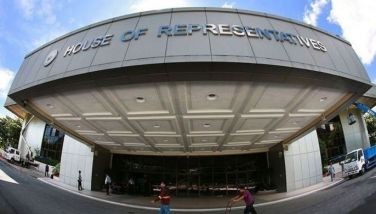Government considering amnesty for Reds
November 4, 2002 | 12:00am
The government plans to offer amnesty to communist rebels to encourage them to lay down their arms and return to normal life, Presidential Spokesman Rigo-berto Tiglao announced yesterday.
The amnesty covers the rank-and-file of the New People’s Army (NPA), the armed wing of the Communist Party of the Philippines (CPP), especially those engaged in actual fighting, he said.
CPP founder Jose Ma. Sison and other rebel leaders living in exile in the Netherlands with pending criminal charges against them, however, face arrest once they set foot on Philippine soil.
But Tiglao said the government will also study if Sison and other rebel leaders would be offered amnesty and have the charges against them dropped.
"We’re really moving toward extending a hand of friendship by coming up with a new amnesty program... We would want to give every communist rebel a chance to reintegrate into mainstream society," Tiglao told reporters.
"We really want them to integrate because it has been so long. The New People’s Army is now made up of old people, an old private army already," he added.
Many of their members are true "patriots" willing to die for their country but are "misguided by some ideologies," Tiglao added. Amnesty would provide them a chance to return to the fold of the law.
"Many of them wanted to join the mainstream but are afraid or don’t know how. For example, there are former Che Guevarra types in the 1970s but now are old and are sometimes acting like stragglers because they don’t know what’s happening in Manila," he said.
The details of the amnesty program, Tiglao added, are being hammered out by Presidential Adviser on the Peace Process Gen. Eduardo Ermita and the National Amnesty Commission. The details are expected to be completed in two weeks.
The government already has an amnesty program for communist and Muslim rebels but Tiglao said "we will have to make it more attractive for (the) communist and New People’s Army."
Records show the National Amnesty Commission has granted amnesty to 10,685 communist guerrillas in over a decade.
Philippine National Police chief Director General Hermogenes Ebdane Jr. said Sison and other rebels who have standing warrants of arrest would be apprehended if they return to the country.
"Of course we have to serve the warrants, our task is to execute warrants, if there’s any. But we have to take the cue from the national government," he said.
Meanwhile, communist rebels have permanently called off peace negotiations after the European Union – after lobbying by Manila – tagged the CPP and Sison as terrorists.
Sison founded the CPP in 1969 and began one of the world’s longest-running communist insurgencies. He and other rebel leaders went into self-exile in the late 1980s in the Netherlands after he was freed from jail by then President Corazon Aquino as a goodwill gesture.
Luis Jalandoni, chief of the CPP’s political wing, the National Democratic Front, said they would "not agree to negotiate under duress."
Press Secretary Ignacio Bunye said the government will continue to negotiate despite the rebels’ terrorist tag. "Whether this would be through indirect or direct means, we still have to work that out."
Rebel spokesman Gregorio Rosal said the CPP will negotiate with the next administration if the government persists in forcing them capitulate.
"If the puppet Arroyo government does not want to negotiate peace and tries to force us to surrender, we are ready to wait and negotiate with the next administration," Rosal said in a statement sent by e-mail to the press.
Jalandoni said the EU did a "great disservice to the Filipino people who aspire for a just and lasting peace" and ignored a call from some members of the European Parliament for negotiations.
"The Council of the European Union is also therefore doing a great disservice to the European peoples," he said.
The EU announcement came after the United States declared the CPP-NPA a terrorist group in September, as did Australia last month.
Rebel leaders earlier denied the terrorist tag, insisting that the CPP is a legitimate political party, decriminalized after the 1986 ouster of the late dictator Ferdinand Marcos.
Following the terrorist listing, Armed Forces chief Gen. Benjamin Defensor and Defense Secretary Angelo Reyes urged the rebels to negotiate and abandon the 33-year armed struggle. Reyes said the EU’s move was a "strategic loss" for the rebels.
Ermita said the terrorist designation would have a major impact on the rebels because "most of their activities in generating resources are undertaken in Europe, where some NGOs (non-government organizations) are the source of funds going to the movement."
Sison said the terrorist tag would only push "the revolutionary forces to wage a fiercer armed revolution against the armed counter-revolution... the revolutionary forces will have no choice but to defend themselves and defeat their oppressors and exploiters in order to bring about national liberation and democracy."
If the NPA escalates attacks on government and civilian targets, Ermita said, they "would prove that they really are (on) the level of the terrorists."
President Arroyo indefinitely suspended formal negotiations with the rebels in mid-2001 when NPA rebels assassinated congressmen Rodolfo Aguinaldo of Cagayan and Marcial Punzalan of Quezon.
However, the government maintained "back-channel" contacts with the insurgents.
The military and the Philippine National Police belittled yesterday the capability of the rebels to mount a full-scale offensive because the rebel strength, according to government estimates, dropped from 25,000 in the 1980s to just 9,000 fighters.
"I doubt if they can carry out a major offensive," Chief Superintendent Robert Delfin, head of the PNP’s intelligence directorate, said.
But military and police officials conceded that the rebels could still launch small-scale attacks against lightly defended government and civilian targets.
In September, NPA rebels posing as soldiers and agents of the National Bureau of Investigation attacked police stations in two remote provincial towns in September. — With reports from Benjie Villa, Artemio Dumlao, AFP
The amnesty covers the rank-and-file of the New People’s Army (NPA), the armed wing of the Communist Party of the Philippines (CPP), especially those engaged in actual fighting, he said.
CPP founder Jose Ma. Sison and other rebel leaders living in exile in the Netherlands with pending criminal charges against them, however, face arrest once they set foot on Philippine soil.
But Tiglao said the government will also study if Sison and other rebel leaders would be offered amnesty and have the charges against them dropped.
"We’re really moving toward extending a hand of friendship by coming up with a new amnesty program... We would want to give every communist rebel a chance to reintegrate into mainstream society," Tiglao told reporters.
"We really want them to integrate because it has been so long. The New People’s Army is now made up of old people, an old private army already," he added.
Many of their members are true "patriots" willing to die for their country but are "misguided by some ideologies," Tiglao added. Amnesty would provide them a chance to return to the fold of the law.
"Many of them wanted to join the mainstream but are afraid or don’t know how. For example, there are former Che Guevarra types in the 1970s but now are old and are sometimes acting like stragglers because they don’t know what’s happening in Manila," he said.
The details of the amnesty program, Tiglao added, are being hammered out by Presidential Adviser on the Peace Process Gen. Eduardo Ermita and the National Amnesty Commission. The details are expected to be completed in two weeks.
The government already has an amnesty program for communist and Muslim rebels but Tiglao said "we will have to make it more attractive for (the) communist and New People’s Army."
Records show the National Amnesty Commission has granted amnesty to 10,685 communist guerrillas in over a decade.
Philippine National Police chief Director General Hermogenes Ebdane Jr. said Sison and other rebels who have standing warrants of arrest would be apprehended if they return to the country.
"Of course we have to serve the warrants, our task is to execute warrants, if there’s any. But we have to take the cue from the national government," he said.
Meanwhile, communist rebels have permanently called off peace negotiations after the European Union – after lobbying by Manila – tagged the CPP and Sison as terrorists.
Sison founded the CPP in 1969 and began one of the world’s longest-running communist insurgencies. He and other rebel leaders went into self-exile in the late 1980s in the Netherlands after he was freed from jail by then President Corazon Aquino as a goodwill gesture.
Luis Jalandoni, chief of the CPP’s political wing, the National Democratic Front, said they would "not agree to negotiate under duress."
Press Secretary Ignacio Bunye said the government will continue to negotiate despite the rebels’ terrorist tag. "Whether this would be through indirect or direct means, we still have to work that out."
Rebel spokesman Gregorio Rosal said the CPP will negotiate with the next administration if the government persists in forcing them capitulate.
"If the puppet Arroyo government does not want to negotiate peace and tries to force us to surrender, we are ready to wait and negotiate with the next administration," Rosal said in a statement sent by e-mail to the press.
Jalandoni said the EU did a "great disservice to the Filipino people who aspire for a just and lasting peace" and ignored a call from some members of the European Parliament for negotiations.
"The Council of the European Union is also therefore doing a great disservice to the European peoples," he said.
The EU announcement came after the United States declared the CPP-NPA a terrorist group in September, as did Australia last month.
Rebel leaders earlier denied the terrorist tag, insisting that the CPP is a legitimate political party, decriminalized after the 1986 ouster of the late dictator Ferdinand Marcos.
Following the terrorist listing, Armed Forces chief Gen. Benjamin Defensor and Defense Secretary Angelo Reyes urged the rebels to negotiate and abandon the 33-year armed struggle. Reyes said the EU’s move was a "strategic loss" for the rebels.
Ermita said the terrorist designation would have a major impact on the rebels because "most of their activities in generating resources are undertaken in Europe, where some NGOs (non-government organizations) are the source of funds going to the movement."
Sison said the terrorist tag would only push "the revolutionary forces to wage a fiercer armed revolution against the armed counter-revolution... the revolutionary forces will have no choice but to defend themselves and defeat their oppressors and exploiters in order to bring about national liberation and democracy."
If the NPA escalates attacks on government and civilian targets, Ermita said, they "would prove that they really are (on) the level of the terrorists."
President Arroyo indefinitely suspended formal negotiations with the rebels in mid-2001 when NPA rebels assassinated congressmen Rodolfo Aguinaldo of Cagayan and Marcial Punzalan of Quezon.
However, the government maintained "back-channel" contacts with the insurgents.
The military and the Philippine National Police belittled yesterday the capability of the rebels to mount a full-scale offensive because the rebel strength, according to government estimates, dropped from 25,000 in the 1980s to just 9,000 fighters.
"I doubt if they can carry out a major offensive," Chief Superintendent Robert Delfin, head of the PNP’s intelligence directorate, said.
But military and police officials conceded that the rebels could still launch small-scale attacks against lightly defended government and civilian targets.
In September, NPA rebels posing as soldiers and agents of the National Bureau of Investigation attacked police stations in two remote provincial towns in September. — With reports from Benjie Villa, Artemio Dumlao, AFP
BrandSpace Articles
<
>
- Latest
- Trending
Trending
Latest
Trending
Latest
Recommended































